Enlarge
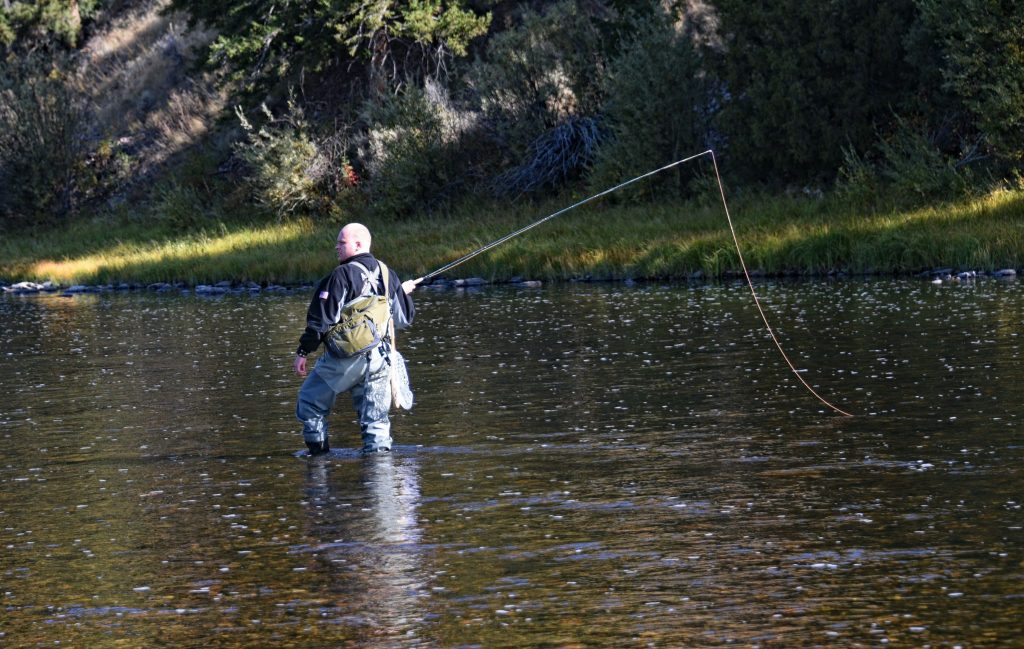
Story by Eric Fowler.
When a roadside bomb exploded next to the vehicle David Landon and his fellow soldiers were riding in on a road in Iraq in 2009, Landon was thrown clear and the others killed instantly.
When a firefight ensued, others in the patrol had orders to pull back and nearly left him for dead. But one soldier thought he saw Landon move, ran into the gunfire and dragged him back to safety.
That was only one of the horrors Landon experienced. When he returned home to Omaha, he went into a shell. He rarely left his bedroom. Once outgoing, he didn’t want to talk to people, not even family. When Landon would see an out-of-place box or backpack alongside a city street while riding in his mom’s car, he curled up in a ball on the floor.
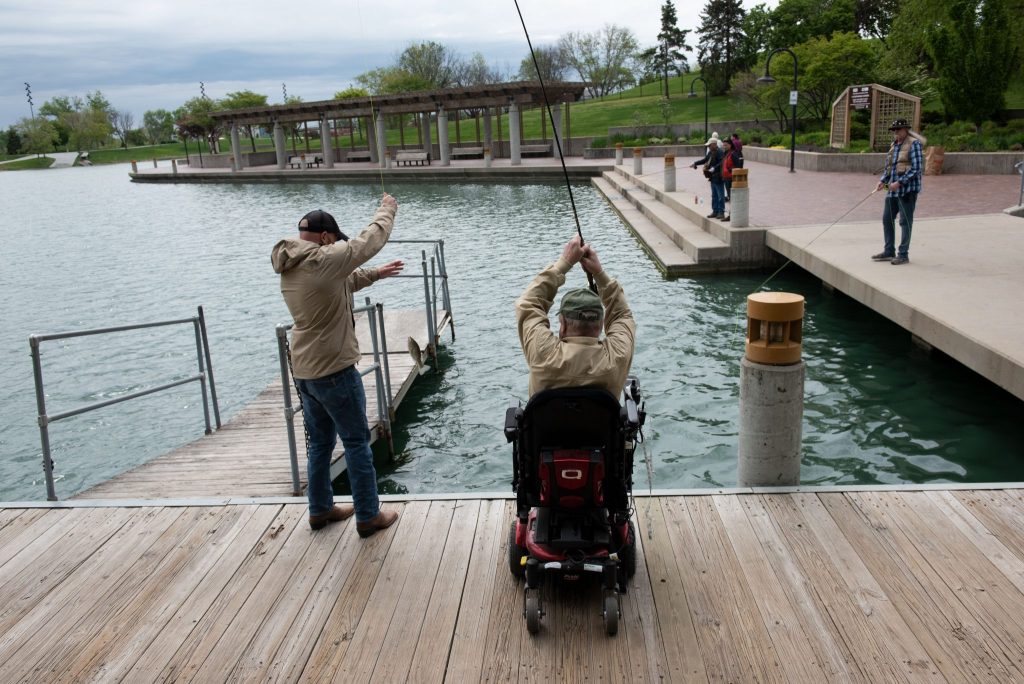
That has all changed since 2015, when Landon picked up a fly rod and started fishing with other disabled veterans who have similar stories. The program that introduced him to the sport is aptly named: Project Healing Waters. For many of the 8,300 disabled current and former service members taking part across the country, the therapeutic value of fishing has been life changing.
Project Healing Waters got its start at Walter Reed Army Medical Center in Washington, D.C., in 2005. It was the brainchild of Ed Nicholson, a Navy captain about to retire and a cancer patient there. Walking the halls, Nicholson saw wounded soldiers returning from Iraq and Afghanistan, many missing limbs. He thought getting them outdoors and away from the hospital would help. Nicholson took a few of them fishing, and soon after, others joined to help. They offered weekly casting lessons on the lawn and fly-tying classes indoors. From there, Project Healing Waters was born.
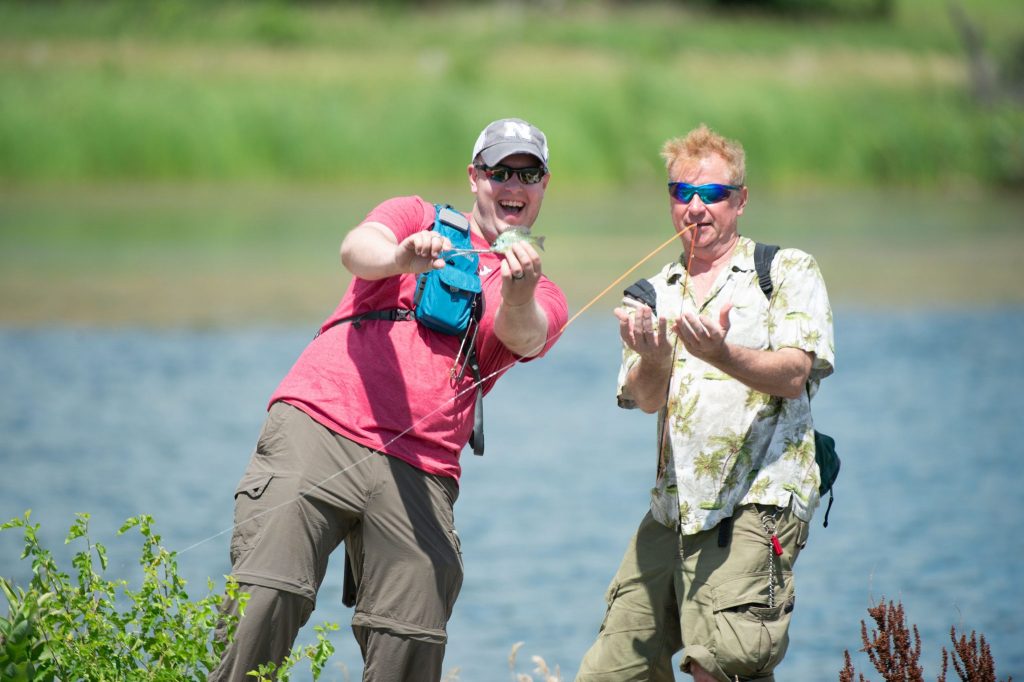
Led by volunteers from local chapters of Fly Fishers International, Trout Unlimited and independent fly-fishing clubs, the organization now has programs in 219 locations in every state and Germany. There are two programs in Nebraska, with Lincoln’s affiliated with the Cornhusker Fly Fishers, and Omaha’s with Trout Unlimited. Its mission is to help in the physical and emotional rehabilitation of disabled active military service personnel and veterans through fly-casting, fly-tying and rod building classes and fishing outings at Department of Defense hospitals, Warrior Transition Units, and Veterans Affairs medical centers and clinics throughout the United States.
One of the wounded service members to take part that first year was a Nebraska native, David Folkerts. Folkerts grew up on a farm near York, joined the Nebraska Army National Guard and decided to make the military a career while at Wayne State College. He graduated in 2004, completed his training and joined the 70th Engineer Battalion, 1st Armor Division, at Fort Riley, Kansas.
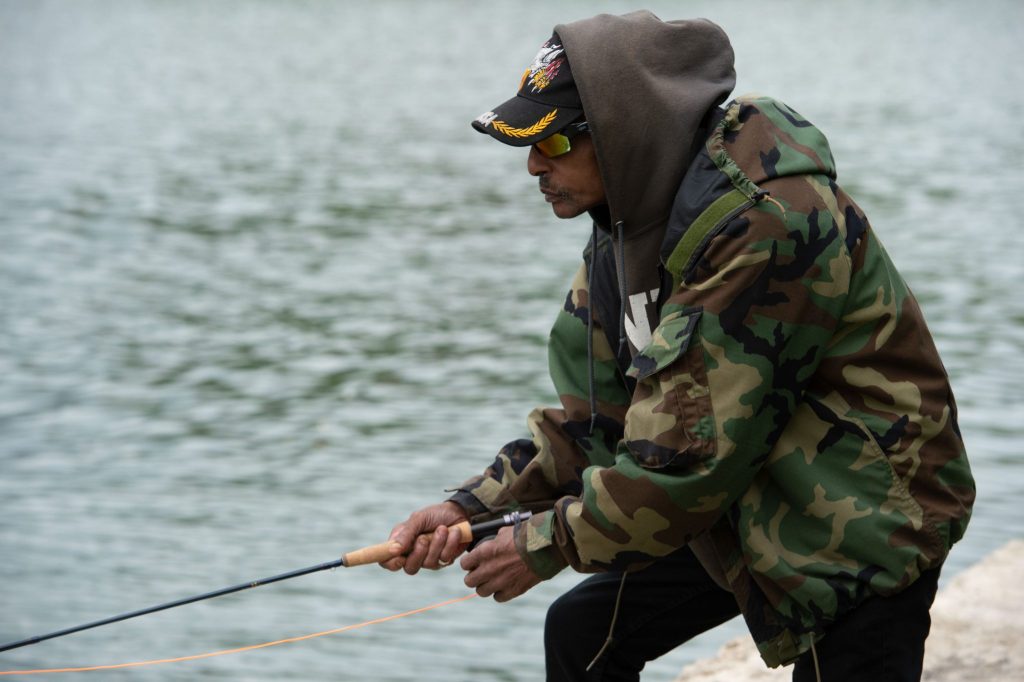
In March of 2005, Folkerts was off to Taji, Iraq. His unit’s job was to make sure roads were clear of roadside bombs and provide security for troops and others on the route. A month after he arrived, he volunteered to be on the team that would lead his platoon down a road to a helicopter crash site. When a roadside bomb exploded, it tore through his left arm and caused profuse bleeding.
“The guys that saw it happen said it blew us up 20 feet in the air and off road,” Folkerts said.
Emergency surgery in a Baghdad hospital included grafting a vein from his leg to save his arm. More surgeries followed at a hospital in Germany after which he was flown to Walter Reed. He would spend more time in recovery than he did doing his job on active duty.
“I was very fortunate, one, that I didn’t die, but two, that I got to save the arm also,” Folkerts said.
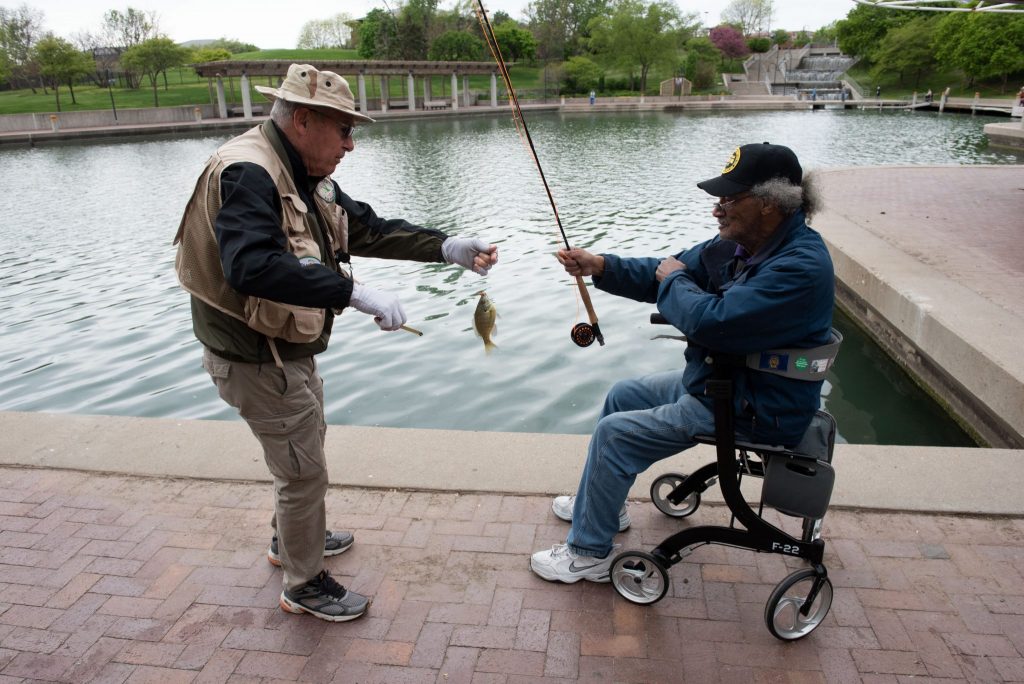
For the next three years, he was back and forth between Walter Reed, where he ran into the folks from Project Healing Waters, and Fort Riley, which was close enough that he could go home on weekends.
There are pictures of Folkerts as a child fishing on Beaver Creek, “a little muddy creek that went through my dad’s cow pasture. I spent many days as a young boy down there with my cane pole and a bobber and worms fishing for bullheads,” Folkerts said.
Fly-fishing, on the other hand, was a foreign concept to Folkerts. Asked to try it at Walter Reed, he initially declined, thinking it looked too complicated.
“My left hand was mostly paralyzed at the time and I was afraid to try it and fail and just be more depressed about my situation,” he said.
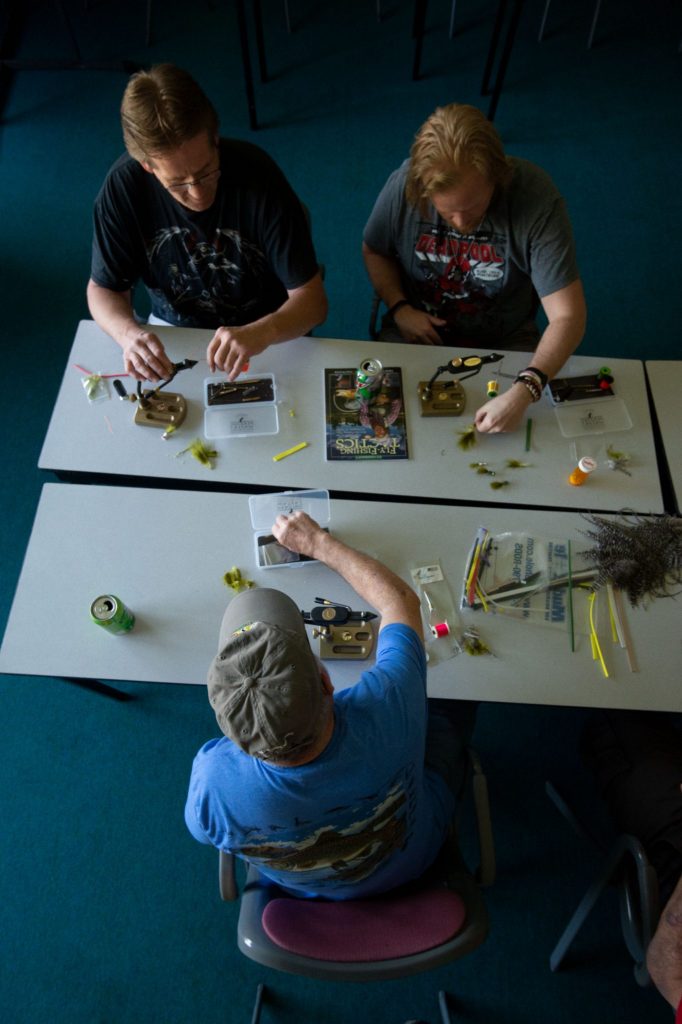
His friends persisted and he eventually did try it, and quickly learned that his left hand functioned well enough to strip and retrieve line while he cast with his right. Soon he went to New York, where he caught his first brook trout on an outing hosted by the fly-fishing club at West Point.
“I pulled it out of the water and took a look at it and saw how beautiful it was. I was like. ‘Wow, this is pretty dang cool.’ I was pretty much hooked there,” he said.
From there he went to every meeting he could, and signed up for a five-day float trip on the Snake River in Montana.
“Just being out in the wilderness and being on that trip with six or eight other disabled vets was pretty amazing,” Folkerts said. “It was an incredibly healing experience for me. When I came back, I just wanted to spread that. I appreciated what the program had given to me and I wanted to start giving back.”
So he started volunteering with Project Healing Waters, helping others at Walter Reed learn what he now calls “the proper way to fish.” Having been wounded in battle gave him “instant credibility” with the soldiers he was helping, and when he medically retired from the Army in 2008, he became the organization’s second full-time employee, taking on the job of starting new programs. Now the national programs officer, Folkerts is in charge of training volunteers across the country, organizing destination outings for the vets, rod-building, fly tying and casting competitions, and other tasks.
What he likes most about the organization is not the fishing, but the “magic” of the relationships veterans build through ongoing activities held at least once a month.
“When you get veterans together in a social setting, it brings back some of that camaraderie they had, and a lot of veterans have a hard time relating or sharing their stories unless they’re talking to another veteran.”
The fly-fishing part is good, too, Folkerts said. There is the sense of accomplishment of building a rod and tying a fly and catching a fish. And of course there is the peace and healing power of being on the water in beautiful places and enjoying nature, and how that can help them cope and deal with their problems.
“It’s kind of the opposite of war in Iraq and Afghanistan, or just war in general,” Folkerts said. “War is like an overloading of your senses of horrible images, horrible experiences. And then getting out and fishing, especially fly-fishing in beautiful places, is like overloading your senses with positive images and positive experiences, and it works.”
The Project Healing Waters program is not just for those who have served in the Global War on Terror. It is also open to any active duty military personnel and any veteran who has suffered a disability, no matter the disability.
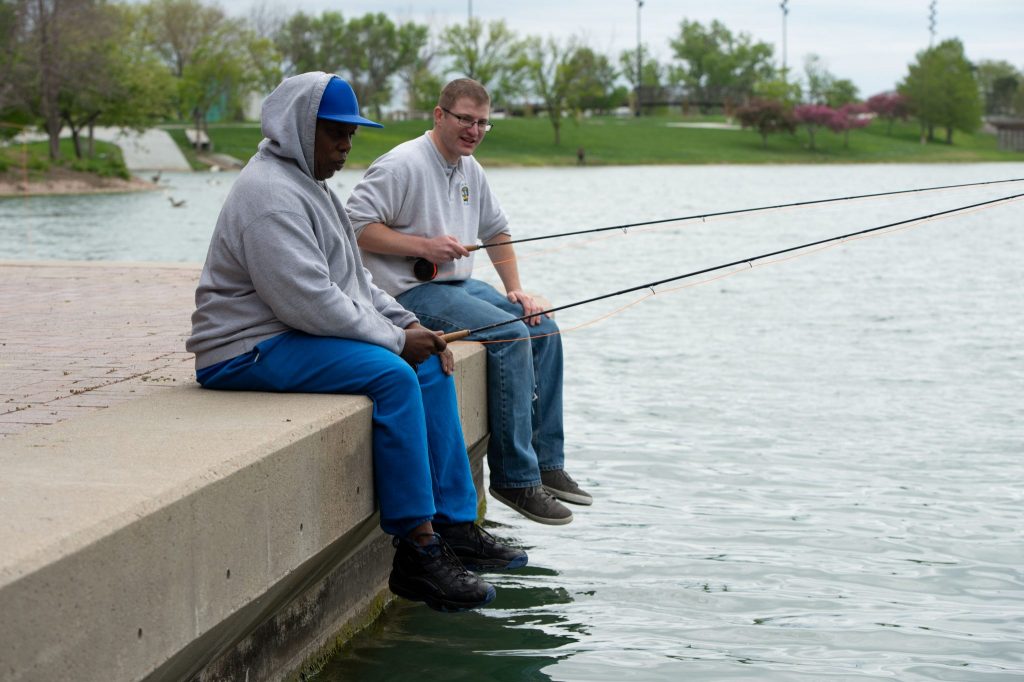
Charles Baswell carried his mental scars from the Vietnam War for decades before he would even talk about them. He joined Project Healing Waters as a participant four years ago, becoming hooked after an invitation to join a fly-tying class at the Veteran’s Administration Hospital in Omaha. He soon volunteered as an instructor and this year took over as the program lead for Omaha Project Healing Waters. He also volunteers at the V.A. Hospital, helping veterans cope with post-traumatic stress disorder.
“I work with these kids all day, and to take them fishing is an extension of the recovery center,” he said. “They come scared. They’re completely isolated. They’re completely detached from society. Some of them, at times, they don’t want nothing to do with anybody. And I understand that. Coming back from Vietnam, that’s the way I was. I recognize myself in these kids.”
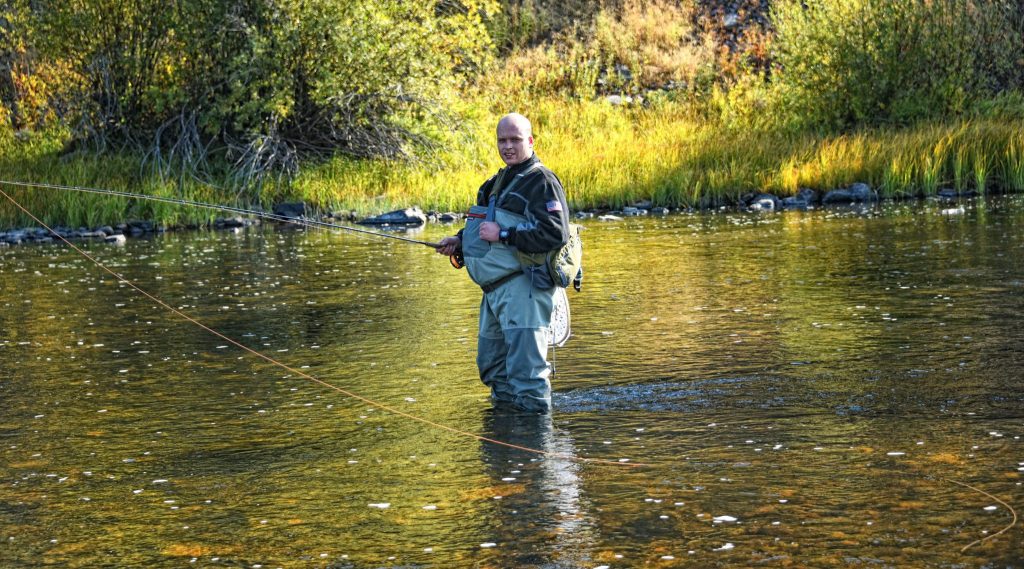
Baswell has seen veterans come out of their shell through Project Healing Waters. But it doesn’t happen overnight. He is in his fourth year in the program, and it took two years for him to start talking about what he saw in Vietnam.
Baswell volunteered to serve in Vietnam, joining the Navy because he loved the water and hoped it would keep him out of the jungle. Instead, he was assigned to be a medic with the First Division, First Company of the Marines. He became friends with those soldiers, and saw many of them die.
“I got there in May of 1967 and I didn’t leave until October of 1968. That’s a helluva time,” he said, pointing to the Tet Offensive in early 1968 as the worst of it. “We saw kids die every day. I still have nightmares where a kid grabs my arm and says ‘Tell my mother I love her.’ How do you absorb that, knowing he’s dying right now? How do you absorb that? This is not once, this was … oh my God … I can’t even … I lost track.”
Like other veterans, Baswell didn’t talk about those nightmares after he returned to the states.
“I was in denial for 50 years,” he said.
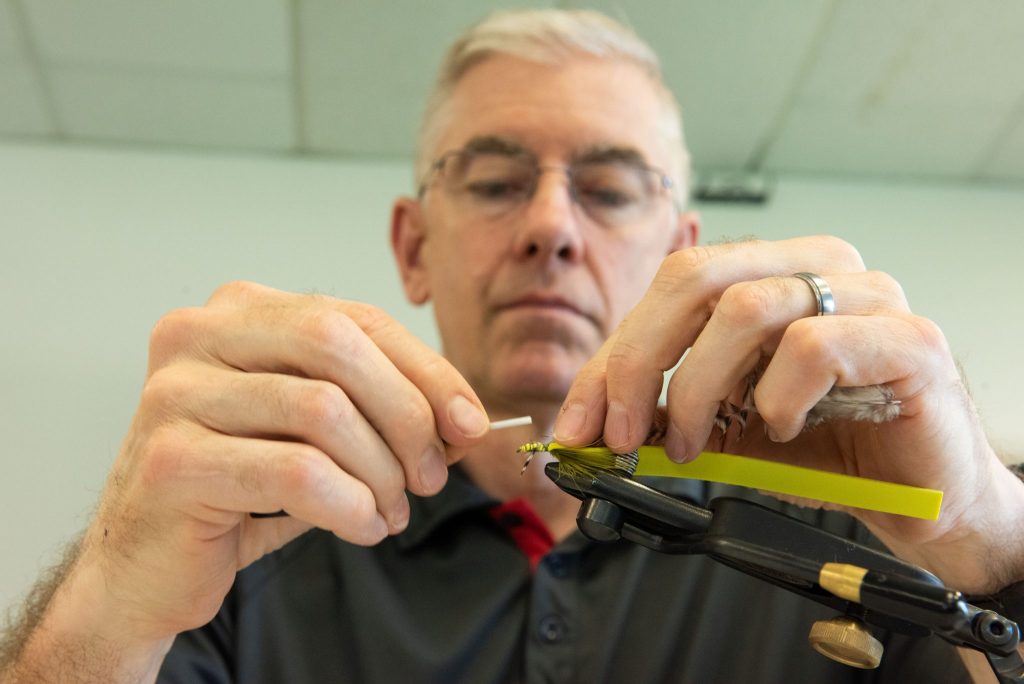
Now he wants to help soldiers returning from Iraq, Afghanistan and elsewhere face their demons and “realize that their sorrow and their pain and their hurt resonates,” Baswsell said. “We help each other.”
Fishing is the perfect distraction, Baswell said. “When people come out here, there are no phones. You’re not listening to the outside world. You’re just watching the water,” he said. Blocking out the noise can give you peace, which can give you hope.
Baswell had fished since childhood, but not until he joined the program did he take up fly-fishing. “It’s my sanctuary,” he said.
When David Landon recovered from the knee, ankle and head injuries he sustained when that improvised explosive device detonated, he returned to action. His mother, Jane Landon, now his full-time caregiver, said she only knows bits and pieces about the things he experienced during his time in Iraq – about as much as the therapists who help him. About getting separated from his unit in Iraq, and saving a bullet for himself because he didn’t want to be captured. About the children who would approach them, and how some were sent carrying bombs and the decisions that had to be made.
“These guys have experienced horrors that they want to lock up in a little box and chain it closed and not deal with it anymore,” Jane said.
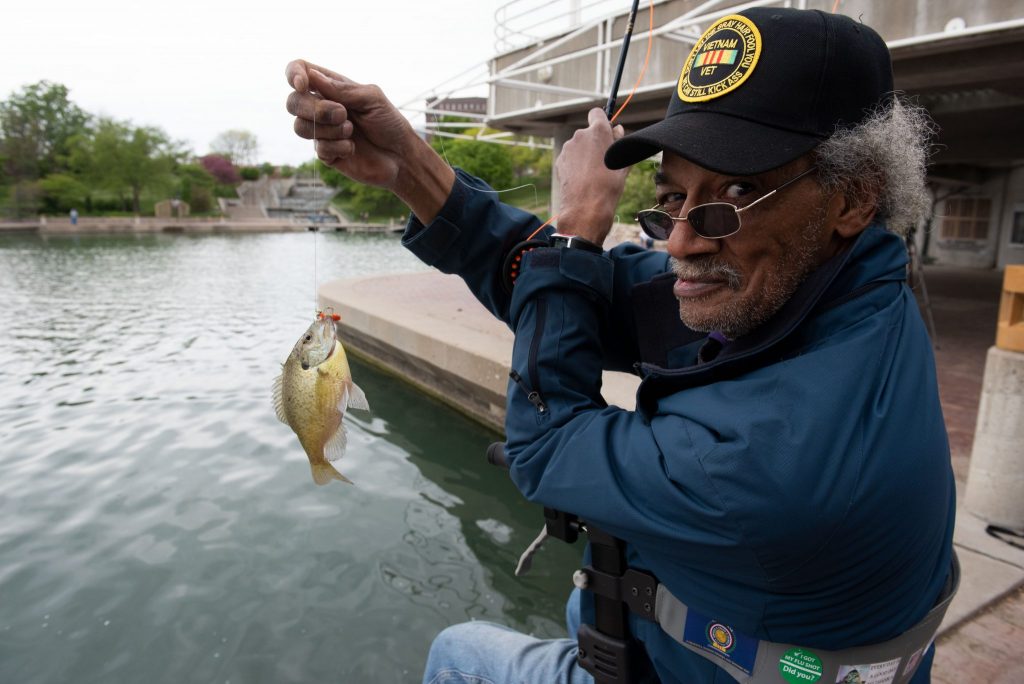
Landon began suffering other maladies. More than once, when his base was being bombarded by missiles, Landon was found walking toward the explosions rather than running away. One of his friends convinced him to seek help. He told the doctors that he saw an English soldier in an old uniform beckoning him, his mother said. Landon was sent to a military hospital in Germany. There he began suffering seizures.
Separated from his friends, “he was a lost soul,” Jane said. “It was the beginning of the depression, the PTSD, the anxiety.”
In 2011, Landon was honorably discharged and returned home to Omaha. Healthy and always outgoing with a wonderful sense of humor when he enlisted, he was now “a shell of his former self,” a recluse who had lost so much weight he was “basically a walking skeleton,” she said.
For four years, little changed. In time, he would come out of his room when family was over, but he didn’t talk, and didn’t stay long.
“He could only take so much,” Jane said.
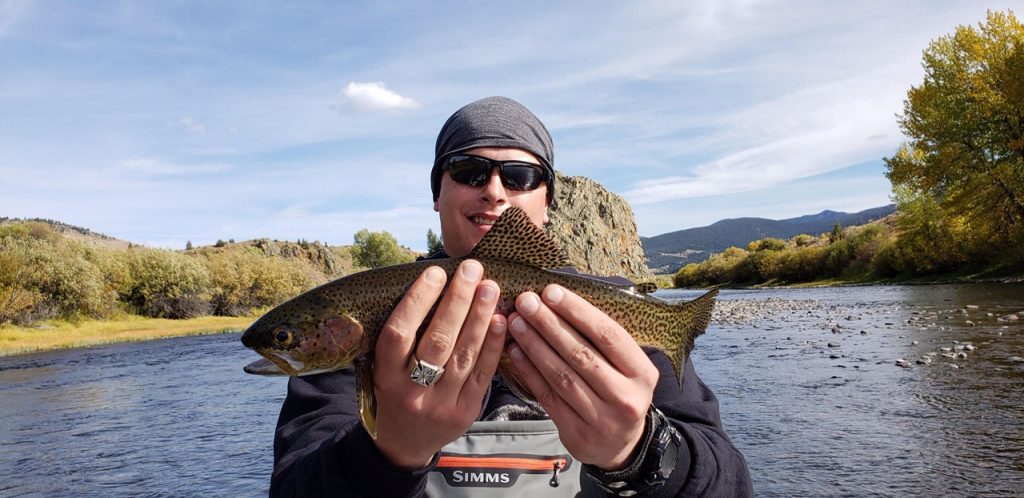
When he became involved in Project Healing Waters in 2015, “there was a little bit of a spark,” Jane said. At first, it was just as much of a struggle to get him to go to the meetings as it was to get him to a doctor’s appointment, but after about a year, he started to open up to the volunteers and other participants.
What really turned Landon around, Jane said, was a five-day trip in 2018 to the Freedom Ranch for Heroes in Wise River, Montana, which hosts hundreds of members of Project Healing Waters each year. There, they connect with other disabled veterans while float fishing the Big Hole River, and relaxing around a campfire at the lodge. Transportation, lodging and food is provided, as also everything they need to fish, from rods to flies to waders. If they have a caregiver, that person gets to go along at no expense as well.
Landon caught the biggest fish, a brown trout, and also cutthroat trout.
“I was going down the rapids and catching fish every five minutes,” Landon said. “It was a blast.”
Landon and the six other disabled veterans on the trip connected immediately and now stay in touch. “The camaraderie was absolutely amazing,” Jane said. “When veterans who have experienced these types of things can get together, they don’t have to retell these stories to share a sense of belonging they don’t necessarily feel when mixed in with the rest of the society. They know. ‘You guys get it. I belong here. I fit in.’”
Landon has opened up more and his focus and self-confidence have improved. He rarely misses a Project Healing Waters meeting, and when there is a fishing outing, he has his gear loaded in the car the night before. He has even begun to take on the role of volunteer, helping others in the program.
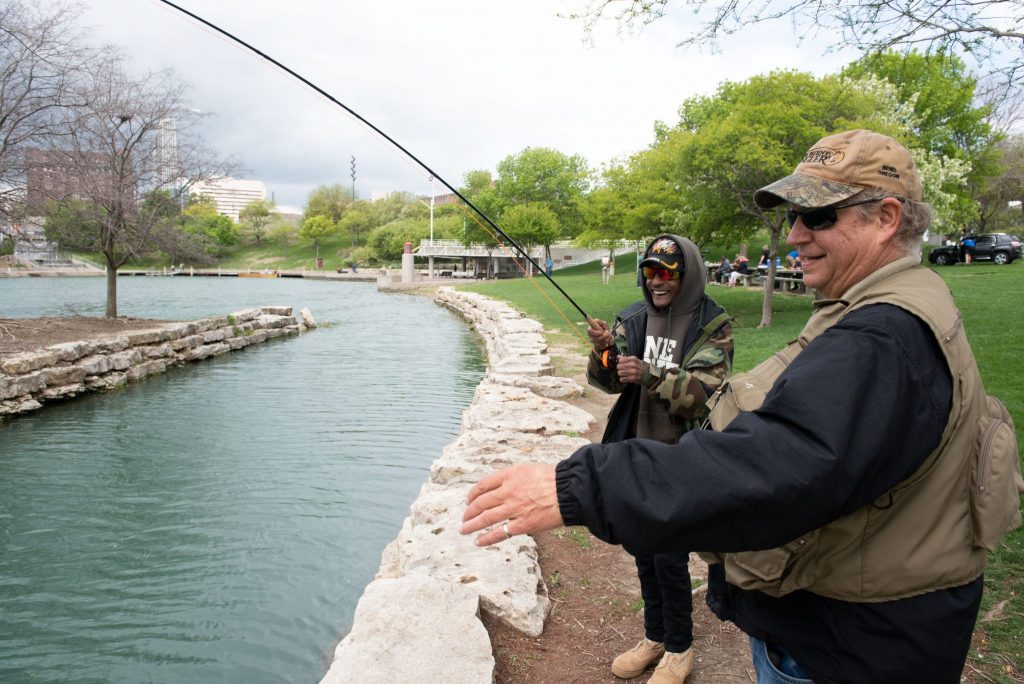
Project Healing Waters hopes to one day serve 30,000 veterans. With 3 million disabled veterans in the United States, there are plenty of candidates. While some have physical disabilities, many more carry emotional scars of battle.
More than 2.5 million Americans have served in the Global War on Terror in Iraq, Afghanistan and elsewhere since the terrorist attacks on the United States on Sept. 11, 2001. Nearly 7,000 have been killed and 53,000 wounded. Studies estimate that as many as 41 percent of returning veterans suffer from some sort of mental disorder, including traumatic brain injuries, post-traumatic stress disorder, depression and substance abuse.
These war-triggered mental health issues have been around as long as war has existed. An estimated 30 percent of 2.7 million soldiers who fought in Vietnam suffered from PTSD at one point or another. More than 30 percent of soldiers sent home during World War II were discharged for psychiatric reasons. The issues have been referred to, among other things, as shell shock or battle fatigue. PTSD wasn’t recognized as a disability by the military until 1980. Treatment has advanced, but there is no panacea.
The implications can be tragic. Suicide rates are 1.5 times higher among veterans than the rest of society, and progress at a rate of more than 20 per day. They are highest among those who have served since 9/11.
Project Healing Waters in 2018
• 219 programs nationwide
• 8,307 disabled veterans served
• 4,001 volunteers spent 294,010 hours serving the program. 20 percent are former participants.
• 4,902 fly-tying classes
• 1,214 rod building classes
• 1,464 fly-casting classes
• 1,124 fly-fishing education classes
• 1,605 fly-fishing outings
• $0 cost to participants
To learn more about the program or to find out how to participate, volunteer or make a donation, visit projecthealingwaters.org.
Landon had fished before, mostly trolling with his dad, but not with a fly rod. He likes the challenge and the reward of catching fish with flies he tied on a rod he built.
“It’s really meditative,” he said. “It keeps you focused. It gives you something to do other than just sit around and mope about the past. Doors open up through Healing Waters. Opportunities with other people and other organizations.
“But mainly I like hanging around the people and just tying flies and just having fun.”
Jane Landon is grateful for how the program has helped her son and others, even though she knows there is more work to do.
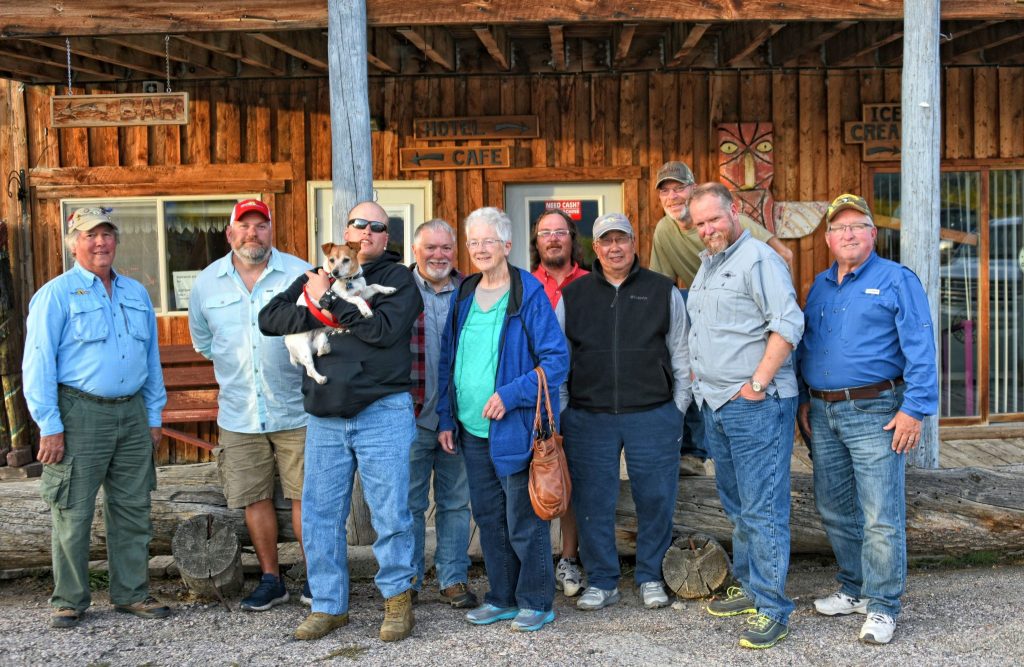
“You’ve got to be patient,” she said. “You can’t assume, ‘Suck it up soldier, march on.’ That may have saved them in Iraq, but they’ve got to come back to our civilization and the rules that helped them survive over in Iraq, you can’t do that here.”
She is thankful Landon made it home. Many of the moms she met in support groups while he was deployed can’t say that. “But he did come home,” she said. “And the difference that I have seen in him since he’s really gotten involved in Project Healing Waters, it just … it does my heart so good because I see that he’s got a future. He sees that. He can laugh again. He sees that there is a purpose to getting up in the morning and getting going and something to do that is worthwhile.
“It has basically been a lifesaver for him.”
Fishing? A lifesaver? How many anglers could have imagined that? ■
The post Project Healing Waters appeared first on Nebraskaland Magazine.

















